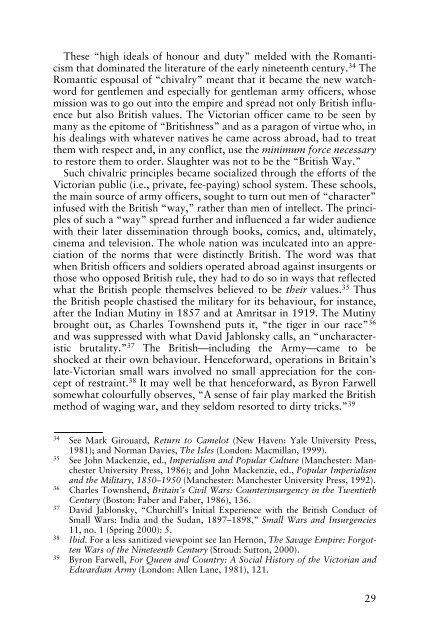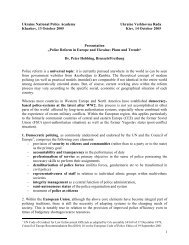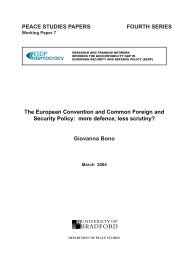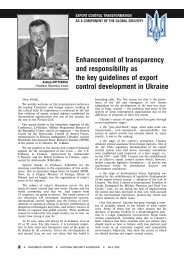combating terrorism and its implications for the security sector - DCAF
combating terrorism and its implications for the security sector - DCAF
combating terrorism and its implications for the security sector - DCAF
Create successful ePaper yourself
Turn your PDF publications into a flip-book with our unique Google optimized e-Paper software.
These “high ideals of honour <strong>and</strong> duty” melded with <strong>the</strong> Romanticism<br />
that dominated <strong>the</strong> literature of <strong>the</strong> early nineteenth century. 34 The<br />
Romantic espousal of “chivalry” meant that it became <strong>the</strong> new watchword<br />
<strong>for</strong> gentlemen <strong>and</strong> especially <strong>for</strong> gentleman army officers, whose<br />
mission was to go out into <strong>the</strong> empire <strong>and</strong> spread not only British influence<br />
but also British values. The Victorian officer came to be seen by<br />
many as <strong>the</strong> epitome of “Britishness” <strong>and</strong> as a paragon of virtue who, in<br />
his dealings with whatever natives he came across abroad, had to treat<br />
<strong>the</strong>m with respect <strong>and</strong>, in any conflict, use <strong>the</strong> minimum <strong>for</strong>ce necessary<br />
to restore <strong>the</strong>m to order. Slaughter was not to be <strong>the</strong> “British Way.”<br />
Such chivalric principles became socialized through <strong>the</strong> ef<strong>for</strong>ts of <strong>the</strong><br />
Victorian public (i.e., private, fee-paying) school system. These schools,<br />
<strong>the</strong> main source of army officers, sought to turn out men of “character”<br />
infused with <strong>the</strong> British “way,” ra<strong>the</strong>r than men of intellect. The principles<br />
of such a “way” spread fur<strong>the</strong>r <strong>and</strong> influenced a far wider audience<br />
with <strong>the</strong>ir later dissemination through books, comics, <strong>and</strong>, ultimately,<br />
cinema <strong>and</strong> television. The whole nation was inculcated into an appreciation<br />
of <strong>the</strong> norms that were distinctly British. The word was that<br />
when British officers <strong>and</strong> soldiers operated abroad against insurgents or<br />
those who opposed British rule, <strong>the</strong>y had to do so in ways that reflected<br />
what <strong>the</strong> British people <strong>the</strong>mselves believed to be <strong>the</strong>ir values. 35 Thus<br />
<strong>the</strong> British people chastised <strong>the</strong> military <strong>for</strong> <strong>its</strong> behaviour, <strong>for</strong> instance,<br />
after <strong>the</strong> Indian Mutiny in 1857 <strong>and</strong> at Amr<strong>its</strong>ar in 1919. The Mutiny<br />
brought out, as Charles Townshend puts it, “<strong>the</strong> tiger in our race” 36<br />
<strong>and</strong> was suppressed with what David Jablonsky calls, an “uncharacteristic<br />
brutality.” 37 The British—including <strong>the</strong> Army—came to be<br />
shocked at <strong>the</strong>ir own behaviour. Hence<strong>for</strong>ward, operations in Britain’s<br />
late-Victorian small wars involved no small appreciation <strong>for</strong> <strong>the</strong> concept<br />
of restraint. 38 It may well be that hence<strong>for</strong>ward, as Byron Farwell<br />
somewhat colourfully observes, “A sense of fair play marked <strong>the</strong> British<br />
method of waging war, <strong>and</strong> <strong>the</strong>y seldom resorted to dirty tricks.” 39<br />
34 See Mark Girouard, Return to Camelot (New Haven: Yale University Press,<br />
1981); <strong>and</strong> Norman Davies, The Isles (London: Macmillan, 1999).<br />
35 See John Mackenzie, ed., Imperialism <strong>and</strong> Popular Culture (Manchester: Manchester<br />
University Press, 1986); <strong>and</strong> John Mackenzie, ed., Popular Imperialism<br />
<strong>and</strong> <strong>the</strong> Military, 1850–1950 (Manchester: Manchester University Press, 1992).<br />
36 Charles Townshend, Britain’s Civil Wars: Counterinsurgency in <strong>the</strong> Twentieth<br />
Century (Boston: Faber <strong>and</strong> Faber, 1986), 136.<br />
37 David Jablonsky, “Churchill’s Initial Experience with <strong>the</strong> British Conduct of<br />
Small Wars: India <strong>and</strong> <strong>the</strong> Sudan, 1897–1898,” Small Wars <strong>and</strong> Insurgencies<br />
11, no. 1 (Spring 2000): 5.<br />
38 Ibid. For a less sanitized viewpoint see Ian Hernon, The Savage Empire: Forgotten<br />
Wars of <strong>the</strong> Nineteenth Century (Stroud: Sutton, 2000).<br />
39 Byron Farwell, For Queen <strong>and</strong> Country: A Social History of <strong>the</strong> Victorian <strong>and</strong><br />
Edwardian Army (London: Allen Lane, 1981), 121.<br />
29

















